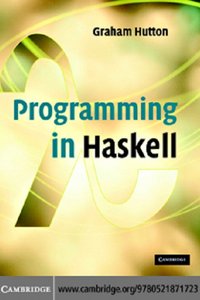
|
FreeComputerBooks.com
Links to Free Computer, Mathematics, Technical Books all over the World
|
|
- Title: Programming in Haskell
- Author(s) Graham Hutton
- Publisher: Cambridge University Press (January 15, 2007)
- Paperback: 184 pages
- eBook: Multiple Formats
- Language: English
- ISBN-10: 0521692695
- ISBN-13: 978-0521692694
- Share This:

|
Haskell is one of the leading languages for teaching functional programming, enabling students to write simpler and cleaner code, and to learn how to structure and reason about programs.
This introduction is ideal for beginners: it requires no previous programming experience and all concepts are explained from first principles via carefully chosen examples. Each chapter includes exercises that range from the straightforward to extended projects, plus suggestions for further reading on more advanced topics.
The author is a leading Haskell researcher and instructor, well-known for his teaching skills. The presentation is clear and simple, and benefits from having been refined and class-tested over several years. The result is a text that can be used with courses, or for self-learning.
Features include freely accessible Powerpoint slides for each chapter, solutions to exercises and examination questions (with solutions) available to instructors, and a downloadable code that's fully compliant with the latest Haskell release.
About the Authors- Graham Hutton has worked in four of the leading centres for research and teaching on functional programming, He has more than fifteen years of experience in functional programming research, during which time he has published more than thirty research articles, chaired the Haskell Workshop and edited a special issue on Haskell of the Journal of Functional Programming. He also has more than ten years experience in teaching Haskell, and in promoting the use of functional programming in the curriculum.

- Programming in Haskell (Graham Hutton)
- The Mirror Site (1) - PDF
- The Mirror Site (2) - PDF
- The Mirror Site (3) - PDF (1076 pages)
-
 O'Reilly® Real World Haskell (Bryan O'Sullivan, et al)
O'Reilly® Real World Haskell (Bryan O'Sullivan, et al)
This easy-to-use, fast-moving tutorial introduces you to functional programming with Haskell. You'll learn how to use Haskell in a variety of practical ways, from short scripts to large and demanding applications.
-
 Exploring Generic Haskell (Andres Loh)
Exploring Generic Haskell (Andres Loh)
This unlocks a new level of skill with this challenging Haskell programming language. Going beyond the basics of syntax and structure, this book opens up critical topics like advanced types, concurrency, and data processing.
-
 The Haskell Road to Logic, Maths and Programming (Kees Doets)
The Haskell Road to Logic, Maths and Programming (Kees Doets)
The purpose of this book is to teach logic and mathematical reasoning in practice, and to connect logical reasoning with computer programming. Haskell is based on a logical theory of computable functions called the lambda calculus.
-
 Learn You a Haskell for Great Good! (Miran Lipovaca)
Learn You a Haskell for Great Good! (Miran Lipovaca)
Packed with the author's original artwork, pop culture references, and most importantly, useful example code, this book teaches functional fundamentals in a way you never thought possible.
-
 O'Reilly® Developing Web Applications with Haskell and Yesod
O'Reilly® Developing Web Applications with Haskell and Yesod
This book is a fast-moving guide to web application development with Haskell and Yesod, a potent language/framework combination that supports high-performing applications that are modular, type-safe, and concise.
-
 The Haskell School of Music - From Signals to Symphonies
The Haskell School of Music - From Signals to Symphonies
This book explores the fundamentals of computer music and functional programming through the Haskell programming language. It explores common paradigms used in algorithmic music composition, such as stochastic generation, musical grammars, etc.
-
 O'Reilly® Parallel and Concurrent Programming in Haskell
O'Reilly® Parallel and Concurrent Programming in Haskell
This hands-on book shows you how to use the language’s many APIs and frameworks for writing both parallel and concurrent programs. You'll learn how parallelism exploits multicore processors to speed up computation-heavy programs.
-
 Yet Another Haskell Tutorial (Hal Daume III )
Yet Another Haskell Tutorial (Hal Daume III )
The goal of this book is to provide a complete intoduction to the Haskell programming language. It assumes no knowledge of the Haskell language or familiarity with functional programming in general.





